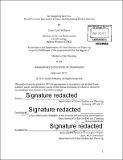| dc.contributor.advisor | Ceasar McDowell. | en_US |
| dc.contributor.author | Williams, Grant Tank | en_US |
| dc.contributor.other | Massachusetts Institute of Technology. Department of Urban Studies and Planning. | en_US |
| dc.coverage.spatial | n-us--- | en_US |
| dc.date.accessioned | 2017-05-11T19:57:39Z | |
| dc.date.available | 2017-05-11T19:57:39Z | |
| dc.date.copyright | 2017 | en_US |
| dc.date.issued | 2017 | en_US |
| dc.identifier.uri | http://hdl.handle.net/1721.1/108954 | |
| dc.description | Thesis: M.C.P., Massachusetts Institute of Technology, Department of Urban Studies and Planning, 2017. | en_US |
| dc.description | Cataloged from PDF version of thesis. | en_US |
| dc.description | Includes bibliographical references (pages 151-156). | en_US |
| dc.description.abstract | At the close of 2016, the United States finds itself deeply fractured, caught between clinging to a nostalgic past and pushing for progressive possibility. As we stand divided, a set of emerging great challenges threaten to rapidly change the world as we know. At such a juncture, I argue that the practice of imagination can help us to break out of habitual thinking and routine practice to see our challenges, and ourselves within them, more fully and clearly. By imagining alternative futures, and communicating them to a broader audience through fiction, I propose we may better understand, collectively, how to enact our agency in the present to address these challenges head-on. In this thesis, I argue for the practice of imagination through the lenses of three great challenges that we face as a nation: politics, the Anthropocene, and a culture of white supremacy. In an effort to identify and bridge the divides that exist within our current political and cultural moment, I propose a 'rural futurism' that centers the experiences, settings, and lives of rural America in imagined futures. I then operationalize the concept of 'rural futurism' on two levels; 1) the realizable potential of local democratic institutions, the rural electric cooperatives, as sites for democratic discourse and self-determination, and 2) speculative futures, communicated through fictional narratives, as a tool for developing critical consciousness in addressing the three great challenges imperative to re-imagining America. I present eight speculative fiction stories of alternative rural futures set in the American south to 'test' the concept of 'rural futurism' as a tool for addressing these challenges. The stories were reviewed by a focus group of southern writers and organizers, who provide the analysis, as well as my personal evaluation, of the stories effectiveness in addressing the challenges described and their resonance with the experience and context of the rural American south. | en_US |
| dc.description.statementofresponsibility | by Grant Tank Williams. | en_US |
| dc.format.extent | 175 pages | en_US |
| dc.language.iso | eng | en_US |
| dc.publisher | Massachusetts Institute of Technology | en_US |
| dc.rights | MIT theses are protected by copyright. They may be viewed, downloaded, or printed from this source but further reproduction or distribution in any format is prohibited without written permission. | en_US |
| dc.rights.uri | http://dspace.mit.edu/handle/1721.1/7582 | en_US |
| dc.subject | Urban Studies and Planning. | en_US |
| dc.title | Re-Imagining America : rural futurism, speculative fiction, And reckoning with a new era | en_US |
| dc.title.alternative | Rural futurism, speculative fiction, And reckoning with a new era | en_US |
| dc.type | Thesis | en_US |
| dc.description.degree | M.C.P. | en_US |
| dc.contributor.department | Massachusetts Institute of Technology. Department of Urban Studies and Planning | |
| dc.identifier.oclc | 986243179 | en_US |
